New Zealand Doctor HOW TO TREAT article
Myalgic Encephalomyelitis / Chronic Fatigue Syndrome
Myalgic encephalomyelitis/chronic fatigue syndrome is a common, debilitating and costly disease. Diagnosing and managing complex chronic conditions such as this is not easy with a 15-minute consultation, but this article, by Cathy Stephenson and Rose Silvester, provides a framework of evidence-based information for GPs working with patients with ME/CFS.
Cathy Stephenson is a GP in Wellington and a health columnist. She has had the privilege of learning about ME/CFS from her patients, and is grateful to one of them for sharing their story here.
Rose Silvester is a clinical psychologist and carer of a person with ME/CFS. She is on the steering group of M.E. Awareness NZ.
This article was originally published in the NZ Doctor, 8th April 2020 edition, as a 5-page article.
In August 2021, M.E. Awareness NZ engaged The Health Media Ltd to reprint the article as a 12-page standalone publication, and we have been given permission to share the pdf of the reprint here.
To read the article: The pdf of the 12-page article is available here (use the button below). An image gallery view is also available below of the original 5-page article. A reference list for the article is also included below to provide easy access.
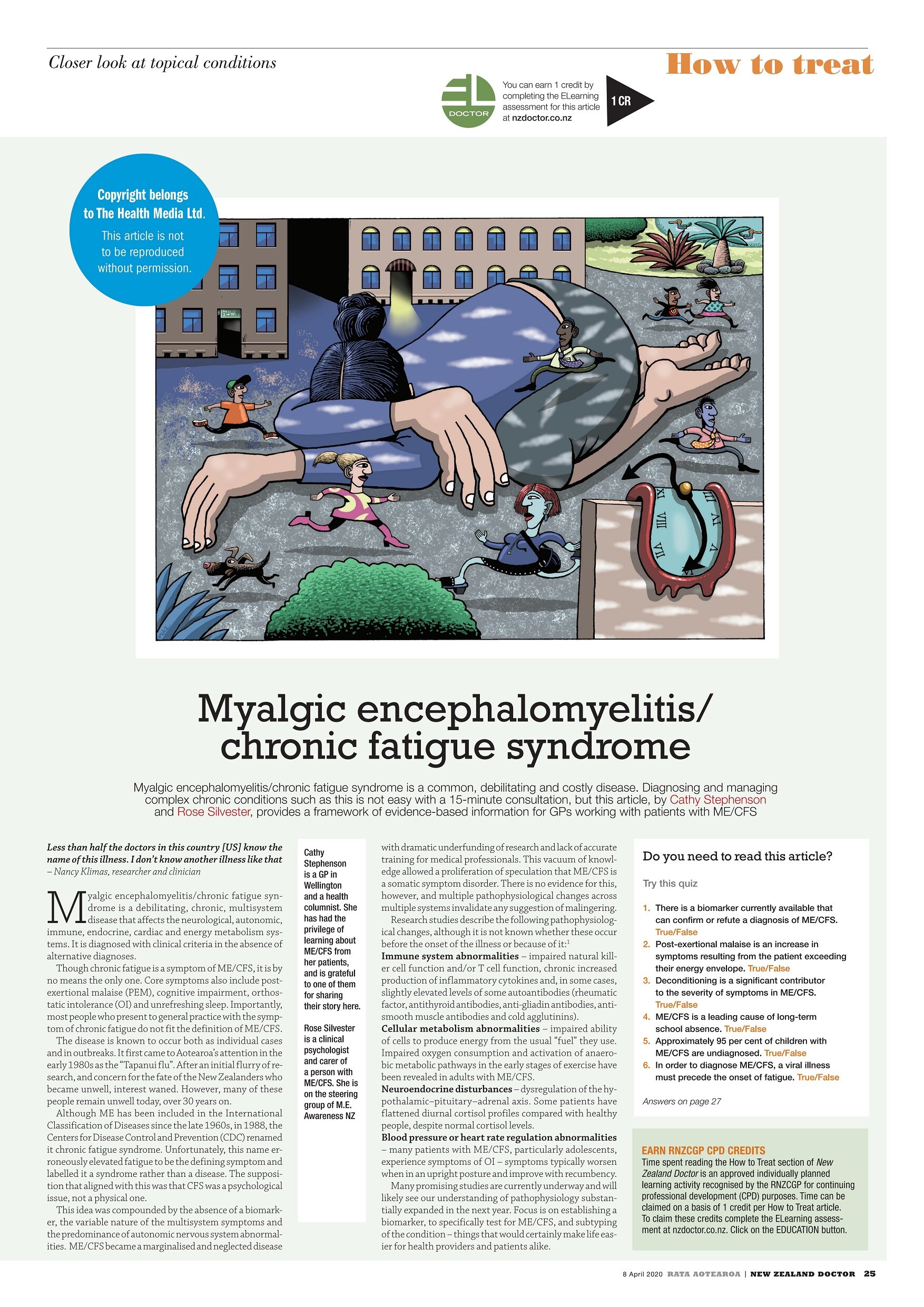
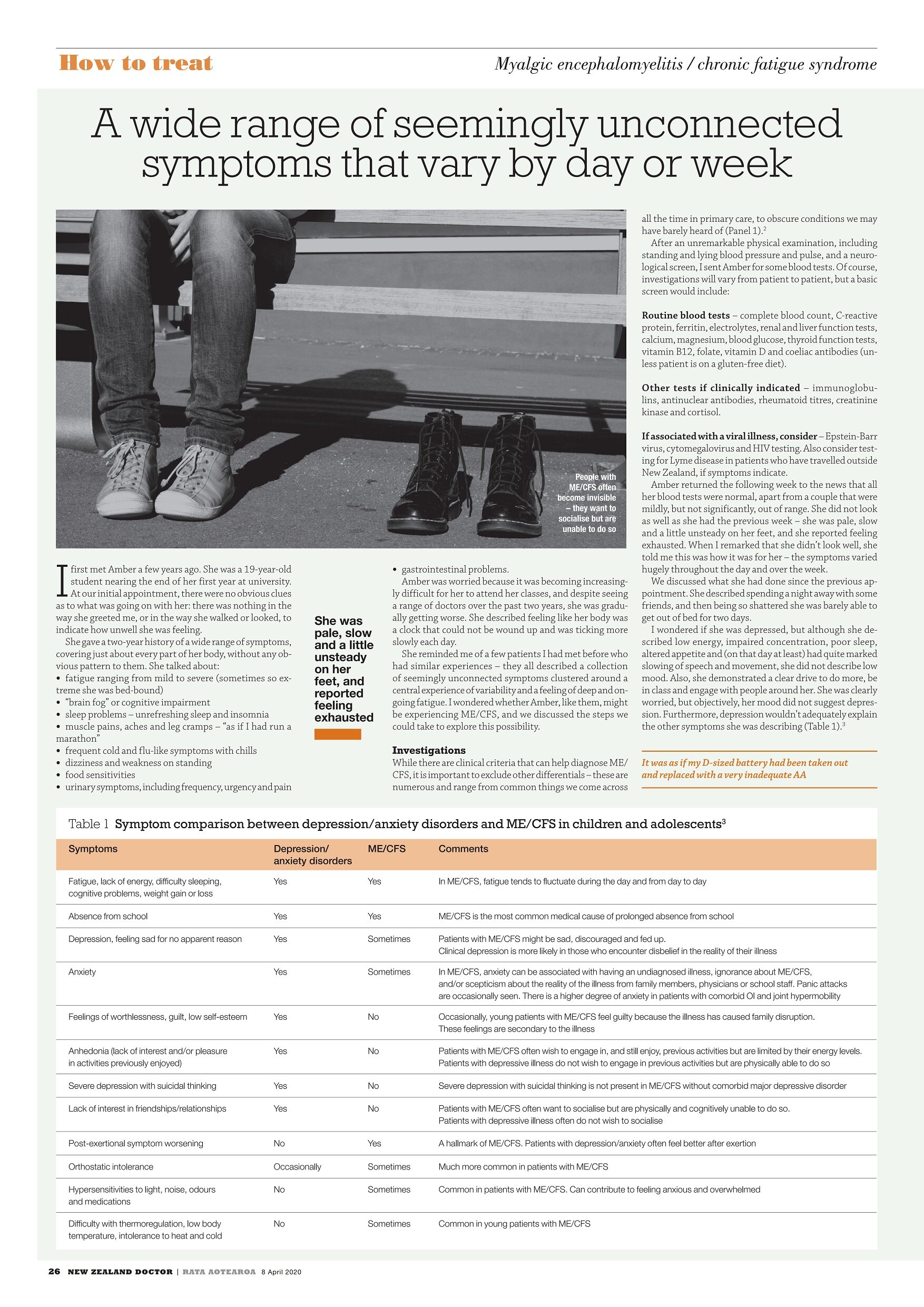
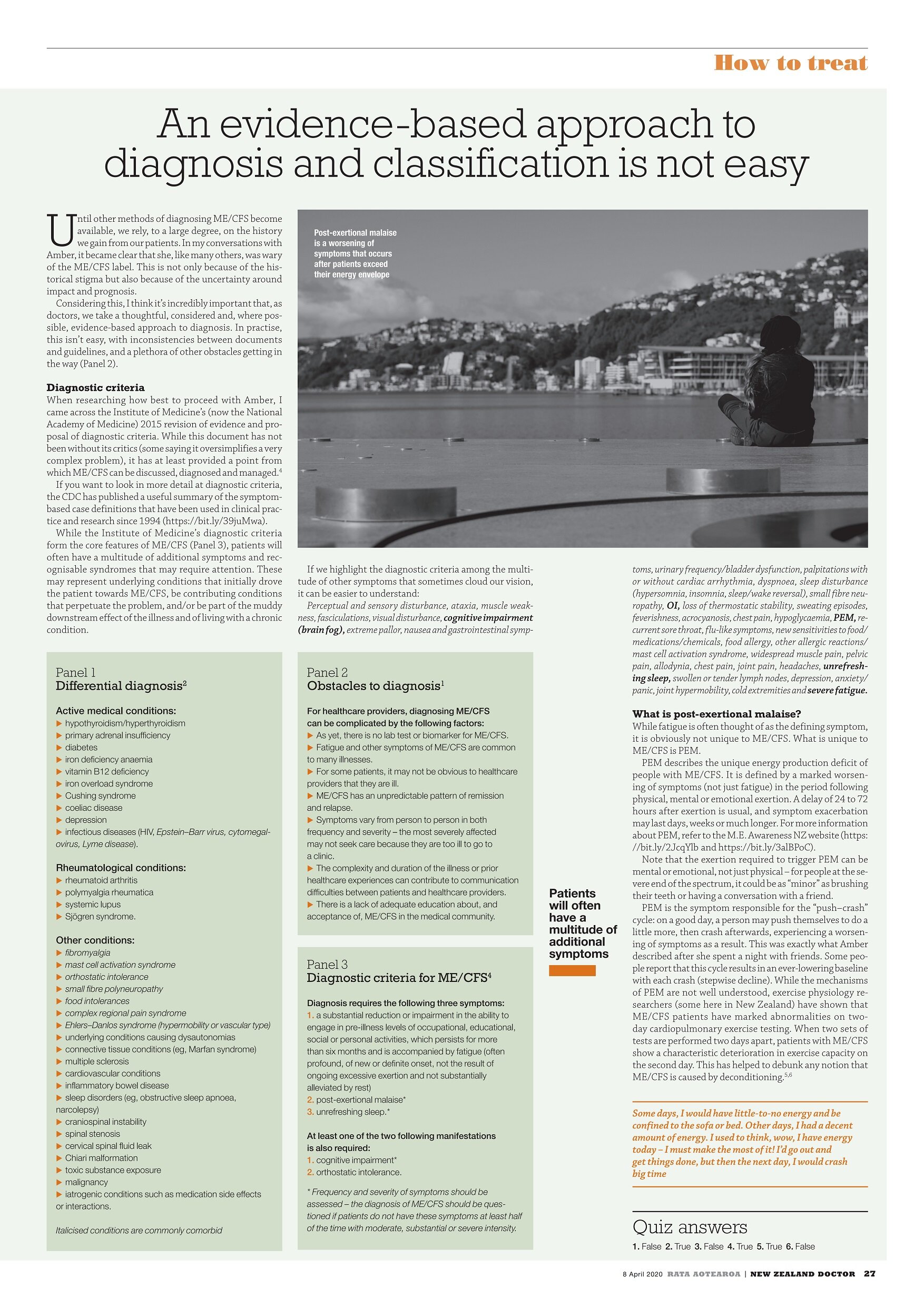
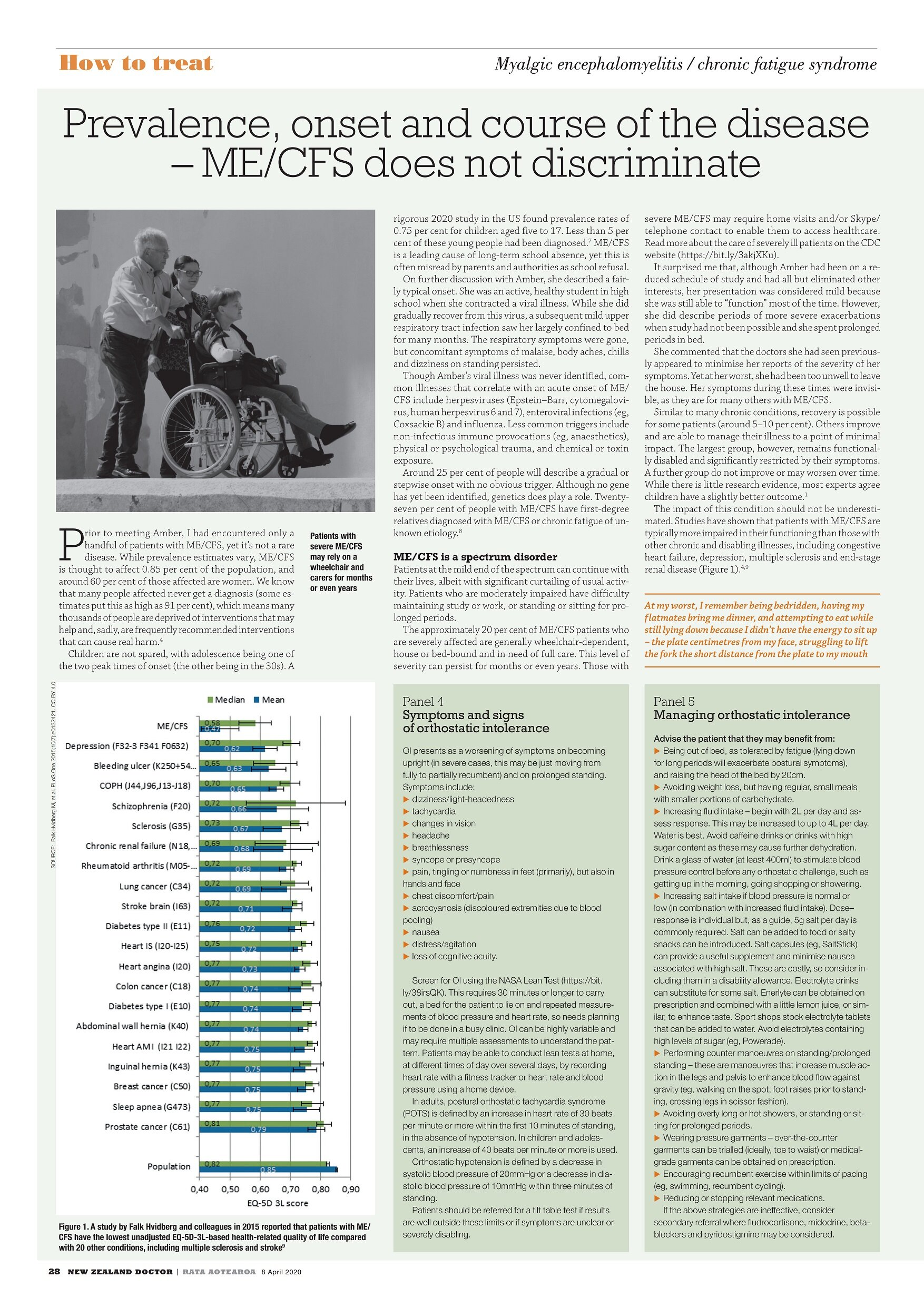
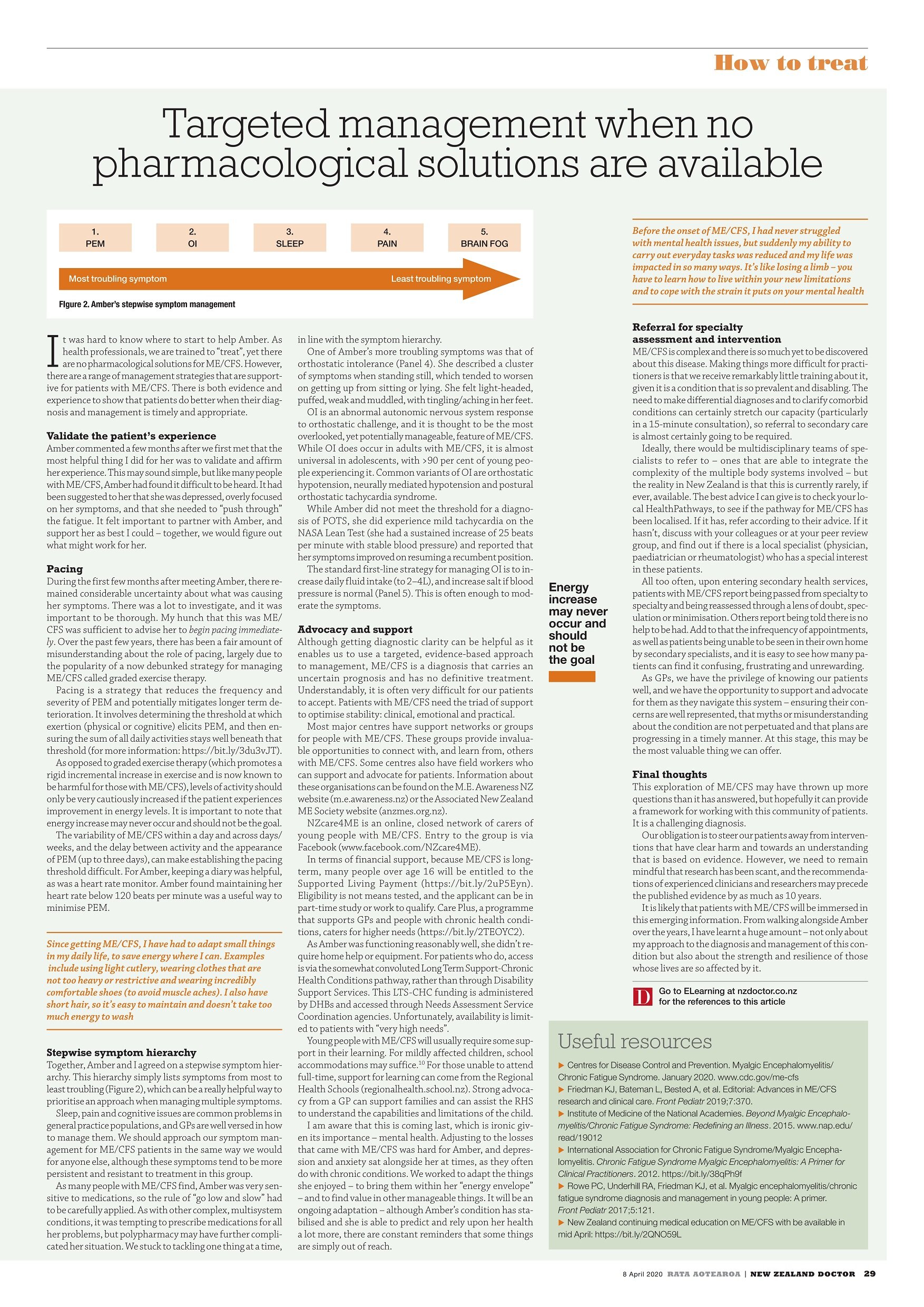
Links to References:
Numbered References
CDC: Information for Healthcare Providers
Research studies describe pathophysiological changes.
CDC: Info for Healthcare Providers: Etiology and Pathophysiology
Panel 2 - Obstacles to diagnosis.
CDC: Info for Healthcare Providers: Factors Complicating the Diagnosis of ME/CFSPanel 1 - Differential diagnosis.
Open Medicine Foundation: New Guidelines for Diagnosing and Treating ME/CFSTable 1 - Symptom comparison between depression /anxiety disorders and ME/CFS in children and adolescents.
Rowe PC, Underhill RA, Friedman KJ, et al. Myalgic encephalomyelitis/chronic fatigue syndrome diagnosis and management in young people: A primer. Front Pediatr 2017;5:121.IOM (now NAM) 2015 revision of evidence and proposal of diagnostic criteria.
Institute of Medicine of the National Academies. Beyond Myalgic Encephalomyelitis/Chronic Fatigue Syndrome: Redefining an Illness. 2015.
Panel 4 - Diagnostic criteria for ME/CFS.
CDC: Info for Healthcare Providers: Diagnosis of ME/CFSResearch studies show ME/CFS is not caused by deconditioning.
van Campen CMC, Visser FC. The abnormal cardiac index and stroke volume index changes during a normal tilt table test in ME/CFS patients compared to healthy volunteers, are not related to deconditioning. J Thrombo Circ 2018:107Research studies show marked abnormalities on two-day cardiopulmonary exercise testing.
Hodges L, Nielsen T, Cochrane D, et al. The physiological time line of post‐exertional malaise in myalgic encephalomyelitis/chronic fatigue syndrome (ME/CFS). Transl Sports Med 2020;00:1–72020 US study on prevalence in children in children and young people.
Jason LA, Katz BZ, Sunnquist M, et al. The prevalence of pediatric myalgic encephalomyelitis/chronic fatigue syndrome in a community-based sample. Child Youth Care Forum 2020; 23 January online.People with ME/CFS have first-degree relatives diagnosed with ME/CFS.
Chu L, Valencia IJ, Garvert DW, et al. Onset patterns and course of myalgic encephalomyelitis/chronic fatigue syndrome. Front Pediatr 2019;7:12Figure 1. A study by Falk Hvidberg and colleagues in 2015 reported that patients with ME/ CFS have the lowest unadjusted EQ-5D-3L-based health-related quality of life compared with 20 other conditions, including multiple sclerosis and stroke.
Falk Hvidberg M, Brinth LS, Olesen AV, Petersen KD, Ehlers L. The health-related quality of life for patients with myalgic encephalomyelitis/chronic fatigue syndrome (ME/CFS). PLoS One 2015;10(7):e0132421Young people with ME/CFS require support in their learning.
CDC: Pediatric ME/CFS: Fact Sheet for Health Professionals
Diagnostic Criteria
CDC summary of symptom based criteria - bit.ly/39juMwa
Opens www.cdc.gov/me-cfs/healthcare-providers/case-definitions-criteria.html
What is post-exertional malaise?
M.E. Awareness NZ guidance on PEM for Clinicians - bit.ly/2JcqYlb
Opens m.e.awareness.nz/guidance-on-pem-for-cliniciansM.E. Awareness NZ guidance on PEM for people with ME - bit.ly/3alBPoC
Opens m.e.awareness.nz/an-explanation-of-pem-for-pwme
ME/CFS is a spectrum disorder
CDC care of severely ill patients - bit.ly/3akjXKu
Opens www.cdc.gov/me-cfs/healthcare-providers/clinical-care-patients-mecfs/severely-affected-patients.html
Panel 4 - Symptoms and signs of orthostatic intolerance
Screen for OI using the NASA Lean Test - bit. ly/38irsQK
Opens www.batemanhornecenter.org/wp-content/uploads/2016/09/NASA-Lean-Test-Instructions.pdf
Pacing
M.E. Awareness NZ guidance on the pacing strategy - bit.ly/3du3vJT
Opens m.e.awareness.nz/a-guide-to-pacing-for-pwme
Advocacy and Support
Access to Supported Living Payment - bit.ly/2uP5Eyn
Opens www.workandincome.govt.nz/products/a-z-benefits/supported-living-payment.htmlCare Plus support for GPs and patients - bit.ly/2TEOYC2
Opens www.health.govt.nz/your-health/services-and-support/health-care-services/care-plus
Useful resources
International Association for Chronic Fatigue Syndrome/Myalgic Encephalomyelitis. Chronic Fatigue Syndrome Myalgic Encephalomyelitis: A Primer for Clinical Practitioners. 2012. bit.ly/38qPh9f
2014 www.iacfsme.org/assets/docs/Primer_Post_2014_conference.pdfNew Zealand continuing medical education on ME/CFS with be available in mid April: bit.ly/2QNO59L
Opens www.thinkgp.com.au/education/mecfs .
For info of RNZCGP credits: m.e.awareness.nz/thinkgp-busting-the-myths-and-redefining-mecfs